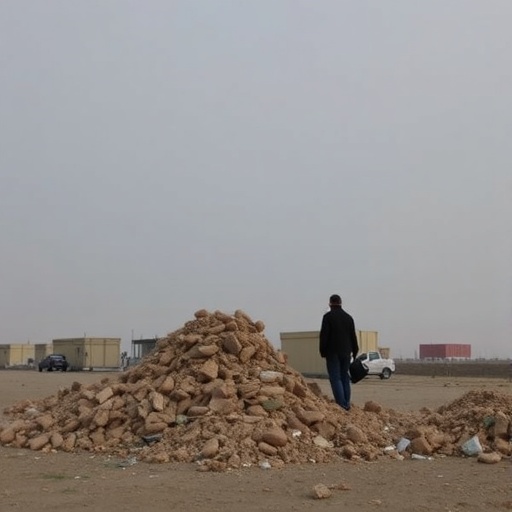In the landscape of modern urbanization, the management of municipal solid waste has emerged as a pressing environmental challenge. Cities around the globe are grappling with the implications of increased waste generation driven by rapid population growth, economic changes, and lifestyle transformations. A recent study focusing on Isfahan, Iran, provides a comprehensive life cycle assessment (LCA) of various waste processing and disposal methods. This meticulous approach reveals not only the environmental implications but also highlights the pressing need for a sustainable framework in waste management.
The study led by Tayebi, Mokhtarani, and Dehnavi illuminates the dire state of waste management practices in Isfahan, a city experiencing excessive pressure on its waste management systems. Municipal waste in Isfahan varies significantly in composition, including organic matter, plastics, metals, and other materials, each presenting unique challenges for processing and disposal. The researchers systematically assessed how these waste materials are handled, transported, and processed, applying rigorous analytical methods to evaluate the ecological footprints associated with different management strategies.
Utilizing life cycle assessment allowed the authors to take a holistic view of waste management practices. This method enables researchers to evaluate the environmental impacts from the inception of waste generation all the way through its disposal stage. By examining processes such as material recovery, landfilling, and incineration, the study captured a broad spectrum of environmental factors, including greenhouse gas emissions, energy consumption, and potential leachate contamination in groundwater.
One of the key findings of the study reveals that the prevalent method of waste disposal in Isfahan—landfilling—poses significant risks to the environment. With landfills often reaching capacity, the unregulated disposal of waste leads to various issues, such as methane emissions and environmental degradation. Given that methane is a potent greenhouse gas, its release represents a critical challenge for local governments committed to reducing their carbon footprint. This study emphasizes the urgent necessity to transition from conventional landfilling toward more sustainable alternatives.
On the other hand, the researchers highlighted the potential benefits of waste-to-energy (WtE) technologies. These systems not only reduce the volume of waste sent to landfills but also contribute to energy production. The LCA revealed that properly implemented WtE processes could significantly lower the environmental impact associated with municipal waste management. However, such systems require substantial capital investment and technological expertise, raising questions about their viability in resource-constrained settings.
Moreover, the study emphasizes the importance of recycling as a significant component of waste management strategies. Currently, recycling rates in Isfahan fall short when compared to international standards. By increasing recycling efforts, the city can not only minimize landfill usage but also recover valuable materials that can re-enter the production cycle. The findings suggest that implementing localized recycling programs could yield substantial environmental benefits and foster community engagement towards sustainability.
Importantly, the research conducted by Tayebi, Mokhtarani, and Dehnavi also addresses the socio-economic dimensions of waste management. Effective waste management is not only an environmental imperative but also a fundamental aspect of public health and quality of life. The study found that inadequate waste disposal practices contribute to various health risks among local populations, further reinforcing the need for comprehensive policy responses.
Through analyzing the established systems of waste treatment, the authors point towards the necessary integration of public awareness campaigns and educational programs aimed at promoting responsible waste disposal practices among residents. By fostering a culture of sustainability, communities can empower themselves to actively participate in waste reduction and recycling initiatives.
Furthermore, the team advocates for robust governmental frameworks that support sustainable waste management practices. Policymakers must recognize the critical importance of environmental sustainability, pushing for legislation that incentivizes innovation in waste processing technologies, facilitates investments in equipment, and fosters partnerships between public and private sectors.
Tayebi and colleagues’ work stands as a clarion call for a paradigm shift in waste management in Isfahan, urging stakeholders to rethink their strategies in favor of a circular economy model. This approach emphasizes utilizing waste as a valuable resource, paving the way towards reduced resource consumption and minimized environmental impact.
The implications of this comprehensive study extend beyond Isfahan. Cities worldwide can learn from these findings as they confront similar challenges in managing their municipal waste. The findings serve as a reminder of the interconnectedness of urban planning, environmental management, and public health.
In conclusion, the life cycle assessment of municipal waste processing and disposal methods in Isfahan, Iran, underscores the necessity for an integrated approach to waste management that is surprisingly absent in many urban frameworks. As cities expand and waste accumulates, the results of this study highlight the urgency for innovative, sustainable solutions that protect both our environment and public health.
Strongly, this research drives home the idea that efficient waste management is a critical issue that intersects with various aspects of society, including environmental sustainability, economic viability, and human health. By embracing a forward-thinking approach, we can strive for a future where waste is not merely discarded but actively managed, reinterpreted, and revitalized.
Through collective action, informed by evidence-based practices like those showcased in this study, the path toward sustainable waste management can not only be envisioned but realized.
Subject of Research: Municipal waste processing and disposal methods in Isfahan, Iran.
Article Title: Evaluating municipal waste processing and disposal methods in Isfahan, Iran: a life cycle assessment approach.
Article References:
Tayebi, S., Mokhtarani, N. & Dehnavi, A. Evaluating municipal waste processing and disposal methods in Isfahan, Iran: a life cycle assessment approach.
Environ Monit Assess 197, 1263 (2025). https://doi.org/10.1007/s10661-025-14740-w
Image Credits: AI Generated
DOI: 10.1007/s10661-025-14740-w
Keywords: Municipal waste, life cycle assessment, waste management, recycling, waste-to-energy, Isfahan, environmental impact, sustainable practices.




